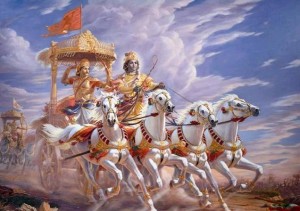Via Ad Deus – Road to God
Finding our new, old road to God | Bellevue First Congregational Church, Bellevue, WA
Learn/Do/Devote — the Bhagavad Gita
Today is a rare quiet day around the house. The kids both made it to school, husband is at his job, and my work starts at 1:45. So I’ve plowed through my urgent t0-do list and have moved on to my secondary tier; Things I Should Do.
- Listen to Somatics Lecture
- Listen passaggio discussion
- Listen to Meaning of Life lectures
- Read 3 back issues of the Journal of Singing
- Read The Christian Agnostic
- Read the daily paper
- Exercise
- Work in greenhouse
The first 5 items are all learning — important learning; pay attention, process, apply. They carry weight and I’m not happy about needing to do them. They require discipline. It would be so much easier to do 6 – 8 and check Facebook. Even writing this blog is easier! Plus, I would like to enjoy this moment of me time, and the first 5 take me out of this moment into the bigger picture.
Unfortunately for my current level of contentment — yes, happiness — this struggle is the point of The Bhadavad Gita. The Gita discusses 3 yogas (yokes); Jnana yoga (knowledge of the cosmos), Bhakti yoga (devotion), Karma yoga (action), in the context of a beautiful text, a song.

The Gita from the great work Mahabharata in the Hindu tradition. It is at least 2800 years old. This scripture contains a conversation between prince Arjuna and his guide Lord Krishna. In this song, Krishna is serving as charioteer for Arjuna on a battlefield where Arjuna faces his own his cousins, uncles, and other family members, as well as his mentors. The battlefield is often analyzed as an allegory for the ethical and moral struggles of human life.
On first glance, it looks like a guide on how to choose which action to take in a big crisis. But as Professor Garfield points out, taken from 3 separate lectures,
… it is really about our own personal relationship to the world in which we live, because as far as the Gita is concerned, the central insight we want to draw from this text is that we live a life in which we are constantly making poignant, important choices – existential choices – and if we don’t understand how to make those choices there’s no way of making meaning out of that life.
We are ephemeral. What happens to us is ephemeral but the universe and the big structure of values endures and that’s what matters. We should be focusing and making these choices in the big context.But the point of the Gita is that action needs to be informed by deep knowledge. A commitment to thinking deeply is necessary. Even more, there is a kind of devotion necessary — not necessarily theistic — but with a kind of subordination of personal goals and interests to those around me and the larger whole.
(Life without discipline) is not freedom at all, that is giving up freedom to ephemeral forces. Self control is freedom … freedom conditioned by Discipline. True values rather than momentary things.
Additionally, Professor Garfield points out that through the Gita we learn that we are not here on the mundane Earth waiting for some elusive salvation and great spiritual gifts, but rather the Universe we are in is the great spirituality. Everything “in the Universe exists in the context of a massive, cosmic Whole.” “We each gain significance in our lives through our relationship to the Whole. It is the Whole that is the source of meaning.”
According to Prof. Garfield’s interpretation of the Gita, I should pay attention to the vast scale, to the Cosmos as a unified, interdependent whole. I must transcend my own individuality — be a part of the vast Whole and all of time — the Whole which is more than I could ever understand.
The big question — how can I have meaning — is answered that it isn’t about me, it is about serving the greater interest, or meaning, of the Universe. But the lecture did not say if the Bhagavad Gita reveals what meaning the greater Universe seeks, so I’m still sitting here with the big question that is only answered in that I should continue to due my duty in the course of life which has been laid out for me.
The Gita is a beautiful, deep text and I intend to study it more.

It is so fantastic that you are working through this. It seems like we need this kind of understanding more than ever. If/when you discover the meaning of life, please track me down and tell me!
This reminded me of some thinking I was doing the other day – I was thinking that maybe one way to think of God is as the collection of all things good in the world. Are our choices in service to that greater good, a contribution to the good things in the world? Perhaps that is similar to what you are exploring here.